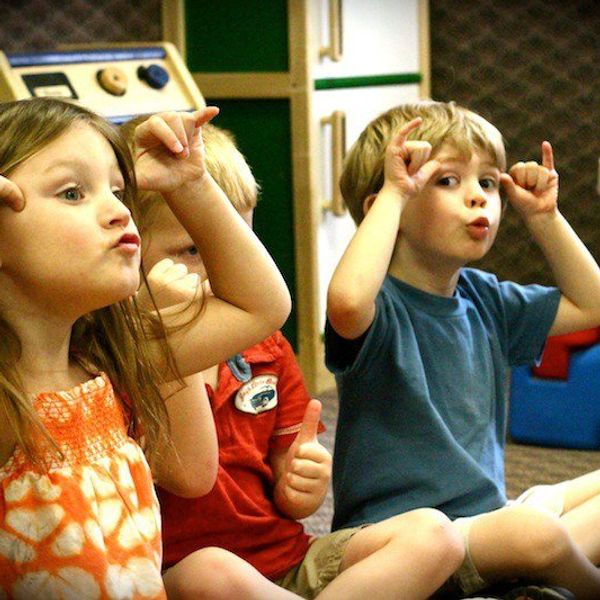I met my neighbor, whom I shall refer to as “Emma,” in the middle of the road on the way to go bowling with my family. As she walked up to the car, she mouthed hello and waved her hand, but she didn’t say anything out loud. In fact, Emma didn’t say a single word to my family or me. Instead, she used her hands to talk.
When I introduced myself, she asked me how to pronounce my name, even though she will never be able to say it.
Emma and her boyfriend are both deaf and, collectively, they parent four hearing children. As my mother and I muddled through signing to her, I found myself very frustrated. My goal as a Mass Communications major is to be able to effectively communicate with people, yet here I was, virtually helpless and unable to communicate with her. The moment I met her, I saw an amazing, loving mother with a spunky personality. The fact that she was the first deaf person I’d ever met only increased my desire to get to know her. I wanted more than anything to be able to talk to her, but I didn’t have a pen or paper with me so I found it very difficult to.
As we were preparing to leave, my Dad looked at her son and began to say, “Tell your mom...” but he was cut short by Emma. She teased, with a grin on her face, “I can read your lips. You don’t have to tell him to tell me. You can just tell me.” As we drove away, I couldn’t stop thinking about Emma.
The next day she came to drop her son off to play with my brother while we stayed upstairs to talk. The first thing I asked her was why she had asked me how to pronounce my name and she responded, “because it helps me to know how to shape my lips when I sign it.”
Over the next hour she taught me some basic signs, and scribbled phrases on paper when I couldn’t read her lips.
She signed to me, “I hate it when hearing people think we ignore them when they try to talk to us from behind. I’m used to rude hearing people because they don’t have patience. Once a woman got mad because I wouldn’t move in a store. It sucks. When I realized she was mad, I told her I’m deaf. She apologized. Before I became a mom, I let it bother me so much, but after kids…they helped me develop a lot of patience.”
She told me several stories like this where she had been treated with disrespect because of her hearing disability. Once in a fast food restaurant, she walked up to order with a pen and paper and the attendant asked for the person behind her to order first. She mouthed to them, “No. That’s rude. I was here first.”
As I sat and listened to these stories, I was shocked at how our society interacts with the deaf community. A few days later, a video popped up on my Facebook feed featuring a deaf woman. This woman said that in her youth, her parents would tell her not to sign in public because it was embarrassing. When I asked Emma if she has had similar experiences, she said that her sister was always embarrassed to sign in public and it caused Emma to have confidence issues.
She told me that transferring to Tennessee School for the Deaf in Knoxville, TN her sophomore year changed her life. She learned American Sign Language, which is more commonly used than SEE, or Signing Exact English. It was at this school that she learned about deaf culture and began to regain her self-confidence.
As a society, we have created a demeaning setting for the deaf community. A spiral of silence is the idea that if nothing is said, nothing is done about an issue. Emma believes there are things that can help the deaf community. “Deaf accessibility is a huge thing we're fighting for these days. We are very under privileged. [People can] join local deaf communities on Facebook, advocate deaf rights and accessibility. Start off small and work your way up.
There is technology designed to help those who are deaf or hard of hearing. For example, I asked her how she knew if her children were crying in the night. She explained that she has a sound sensor attached to a lamp and when the sensor is set off by loud noises, the lamp turns on to wake her up. To make phone calls, she contacts a national company called Sorenson that allows her to video chat with a company interpreter who then makes the call for her.
“Some hearing people ask me stupid questions like, "can you drive?” I respond ‘Yes, really. Do you use your ears to drive?.’ They would say 'no.' Exactly. We use our eyes to drive.”
She has adapted to living in both the deaf and hearing worlds because she needs both. Deaf culture is part of who she is, but she lives in a world where the majority of people can hear, including her family and children. Emma has learned to overcome the challenges presented by being deaf simply by being patient and persistent.
At the end of our conversation she said, “Don’t feel sorry for me.” She said there are benefits to being deaf like not having to roll down the car window to talk to someone, or being able to sleep through thunderstorms.
Emma said to me, “I think that my hearing disability has enabled me to become a good listener.”





















